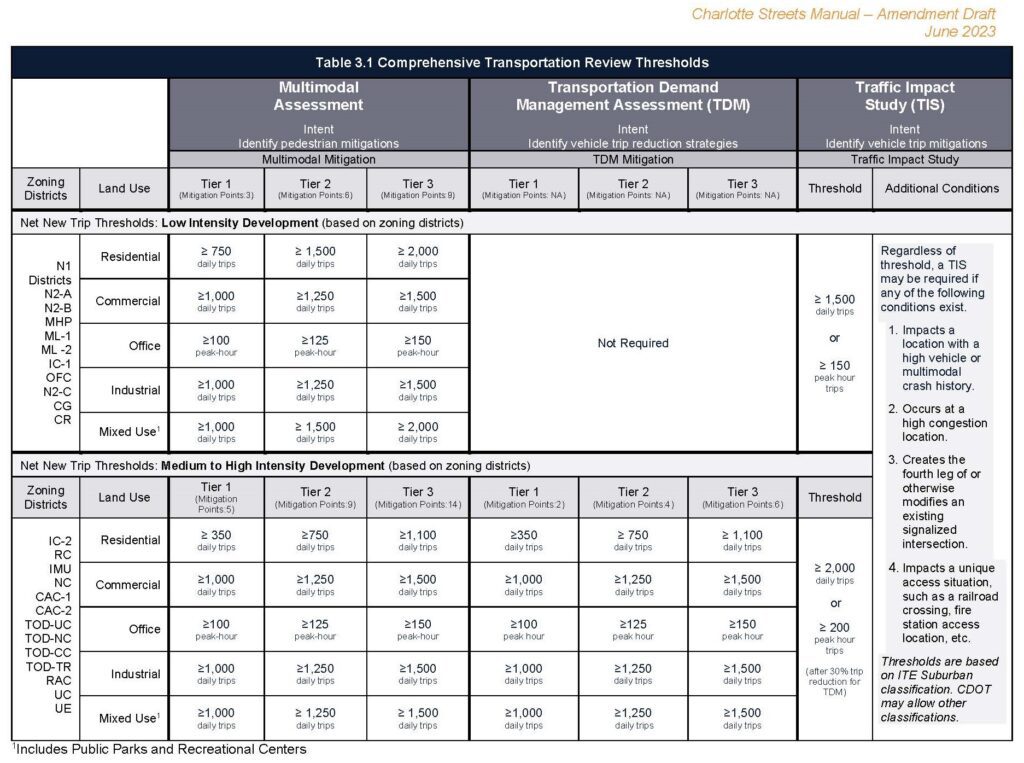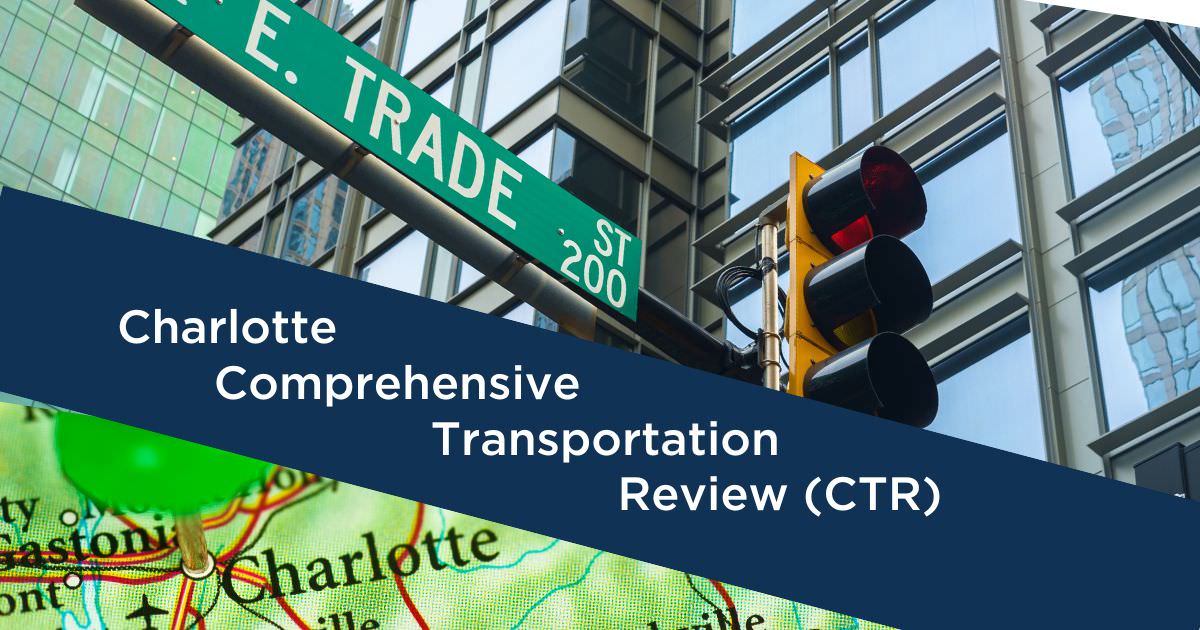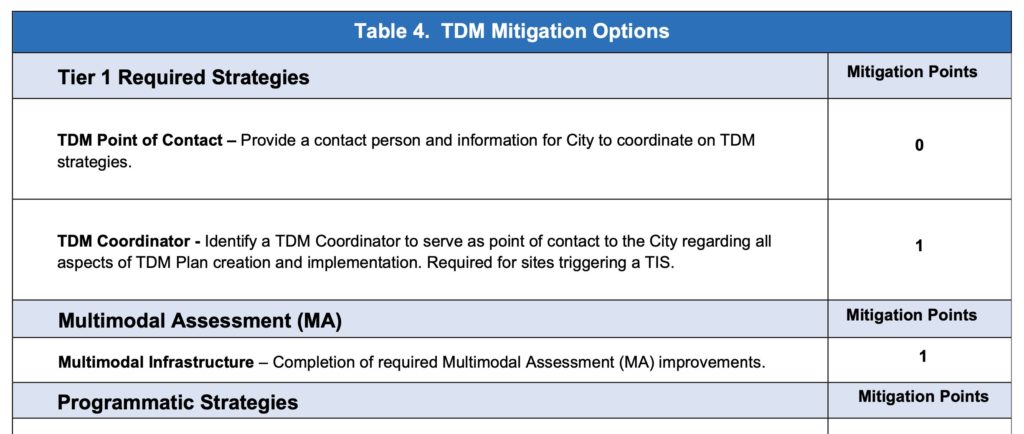On August 22, 2022, the City of Charlotte, North Carolina adopted the Comprehensive Transportation Review (CTR) Guidelines as part of the Unified Development Ordinance (UDO) to advance the City’s transportation goals, including providing safe and equitable mobility options for all travelers. Under the CTR guidelines, developers and property owners may face three kinds of transportation assessments which our Charlotte transportation consulting team explains here.
Charlotte’s CTR process features three types of transportation assessments:
Both the type of assessment and the tier that is triggered are based on vehicle trip generation thresholds for a given development, as can be seen in Table 1 from the City’s transportation planning page.

TDM Vehicle Trip Reduction Strategies in Charlotte
TDM mitigation for new developments is required for medium- to high-intensity development, with thresholds defined in the City’s CTR Threshold chart.
In general, larger projects in certain Zoning Districts will need to commit to enough TDM strategies to meet the mitigation points requirement as outlined in the CTR guidelines’ Table 4: TDM Mitigation Options. The larger the traffic impact that a given project has, the larger the number of mitigation points will be required to commit to in order to fulfill the TDM requirement. Each of the strategies in Table 4 has a corresponding investment and ROI for different land uses. These strategies are grouped into the following categories:
- Programmatic strategies (such as marketing, outreach, transit fare subsidies, vanpool programs, and flexible work schedules)
- Physical strategies (such as bicycle facilities, shared ride parking spaces, and onsite childcare)
- Active transportation strategies (such as bicycle parking and bikeshare stations)
- Transit strategies (such as transit service upgrades and shuttle/connector services)
- Parking strategies (such as shared parking and price parking)
Charlotte’s CTR Traffic Impact Study Requirements
The intent of a Traffic Impact Study (TIS) under the CTR guidelines is to identify site-specific and development-related ways to mitigate the impact of vehicles on a development. Traffic impacts studies may be required under certain conditions, including if a development or property:
- Impacts a location with a high vehicle or multimodal crash history
- Occurs at a high congestion location
- Creates the fourth leg of or otherwise modifies an existing signalized intersection
- Impacts a unique access situation, such as a railroad crossing or fire station access location
As shown above, Table 1 provides the thresholds under which a TIS is required. While the CTR guidelines spell out the requirements and expectations of a traffic impact study, at a minimum a TIS study area includes:
- all site access points,
- the nearest signalized intersections in all directions from site access points,
- all signalized intersections where the development is likely to reduce Level of Service at the intersection,
- unsignalized intersections and access drives within the development’s area of influence, and
- both sides/direction of any interchange within the development’s area of influence.
Traffic Impact Studies must be prepared by a Professional Engineer registered with the state of North Carolina.
Multimodal Assessments under Charlotte’s CTR Guidelines
Multimodal Assessments serve to identify pedestrian, bicycle, and transit-related infrastructure necessary to establish an “accessible and connected multimodal network.” Assessments can include:
- sidewalks and shared use paths
- intersections and accessible ramps
- pedestrian crossings
- street lighting
Just as it explains thresholds for TDM trip reduction strategies and traffic impact studies, Table 1 makes it clear that multimodal mitigation is called for across residential, commercial, office, industrial, and mixed-use developments.
Professional Requirements for CTR Assessments and TDM Trip Reduction and Multimodal Assessments
Applicants may request CTR scoping and review meetings to discuss their potential project. While traffic impact studies, as noted above, require a certified Professional Engineer, the Multimodal Assessments and Transportation Demand Management (TDM) assessments may be prepared by a transportation planner, a landscape designer, an engineer, or other transportation professionals with “competency and experience with such analyses,” as agreed upon during the scoping meeting with the City.
Contact Our Charlotte Transportation Team
Patrick Monroe, P.E.
Regional Manager
pdmonroe@wellsandassociates.com
As a Professional Engineer based in Charlotte and a former Senior Engineering Project Manager at CDOT, Patrick works with our clients on a wide range of traffic engineering, multimodal transportation planning, and real estate development projects, including traffic impact studies and multimodal assessments.



